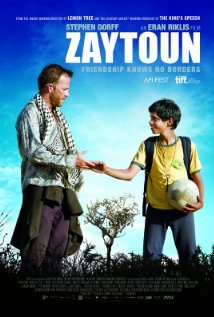
ZAYTOUN
Israel/France, 2012, 110 minutes, Colour.
Stephen Dorf, Abdalla El Akal, Alice Taglioni.
Directed by Eran Riklis.
Eran Riklis has made some significant films about Palestinian- Israeli relationships. The most moving and significant was The Lemon Tree, seen around the world. He also made The Human Resources Manager in a story set in Romania as well as the sports coaching film, Playoff.
This film is set in 1982, with Israeli hostilities towards Lebanon, seen in such films as Beaufort, Lebanon, Waltz with Bashir. The focus is on the Palestinian camp outside Beirut, and a young boy whose mother is dead, whose zealous father is suddenly killed on the streets, with the support of grandfather, and friends who do with him to sell goods on the streets of Beirut. When an Israeli jet is downed and the pilot ejects, he is captured and kept in a dark room. The young boy shoots him and he has to go to hospital just as one of the boy’s friends has been shot by guards in the street.
The boy decides that he would like to go with the pilot into Israel and into the Palestinian territories to see his old house and plant his father’s small olive tree, that being the meaning of the title, Zaytoun.
But then the film is something of a road film, the dangers of travelling around Lebanon and being interrogated by the police, crossing the border where the pilot is welcomed, where the UN have some jurisdiction. The pilot and the boy are given 24 hours to travel to find the house, which they do, in ruins, and the boy plants the tree.
The film is realistic but also an allegory of the possibilities of bonding between Israelis and Palestinians.
1. The work of the director? Israel and Palestine reconciliation? Israel and its policies, history?
2. The film and its realistic story, yet symbolic? Zaytoun, the word for “olive” – and the symbolism of planting the tree in Palestine?
3. The situation in 1982, in Israel, the Palestinian camps in Lebanon, the role of the PLO, Israel’s aerial attacks, difficulties on the border, pressurising the Palestinians?
4. The location photography, Lebanon, Beirut, the streets, the internment camp, the countryside? The border with Israel? The UN? The ruined homes in Palestine? The musical score, moods – and contemporary songs like Stayin’ Alive?
5. The introduction to Fahad, selling on the streets of Beirut, his stores, the UN woman buying something, talking to him, the police rounding the boys up, his friends, their being chased? At home, his mother dead, grandfather and support, his father and his militancy, rushing to help and being killed? The olive tree and the hopes for planting it? Having the key of the house?
6. The military training for the boys, their attitudes, anti-Israel, the jets flying over, the boys outside the camp, running across the space and risking being shot, Ahmed being shot?
7. Capturing the pilot, binding him, not giving him water, Fahad shooting him in the hip, his being in hospital, Ahmed coming, the two together, the work of the doctor? Ahmed dying?
8. The Lebanese authorities, the police? Talking with the boys, the gun?
9. Yoni, his story, strong Israeli stances, the photo of his pregnant wife, his missions?
10. Fahad, talking with Yoni, trying to persuade him to take him into Israel and to Palestine? To contact the US Embassy? Fahad and his tree? Yoni, the taxi, going back for Fahad, the trip, the driver and the promise of money? Fahad and his giving Yoni the wrong words, swear words instead of greeting?
11. Fahad, his age, his experience, the effect of what was happening in Palestine, hostility to Israel? His grandfather and his patience, his hopes?
12. The escape, the ups and downs, changing situations, the taxi, the promise of money, the authorities, the markets and buying goods, the petrol station, on the run and taking the truck?
13. Driving to the border, Yoni and his wound, Fahad tending it with herbs and alcohol? The crash? the police questioning Fahad, assuming Ahmed’s identity, Fahad knowiing that they were testing about the teacher at school? Rescuing the car, not putting on the brake? Walking, the donkey ride, the dangers in the minefield?
14. The border, Yoni being welcomed, the UN? Discussions about Fahad? His silent reactions? The new clothes and sneakers?
15. Official discussions, the decision to give Yoni 24 hours, driving, through the night, guessing the way to the village, finding it, the ruined house, the door and the key, planting the olive tree?
16. The return, Fahad happy with what he had achieved? Yoni and his promise to visit him? The embrace?
17. The film story and the possibility for bonding between Israelis and Palestinians?